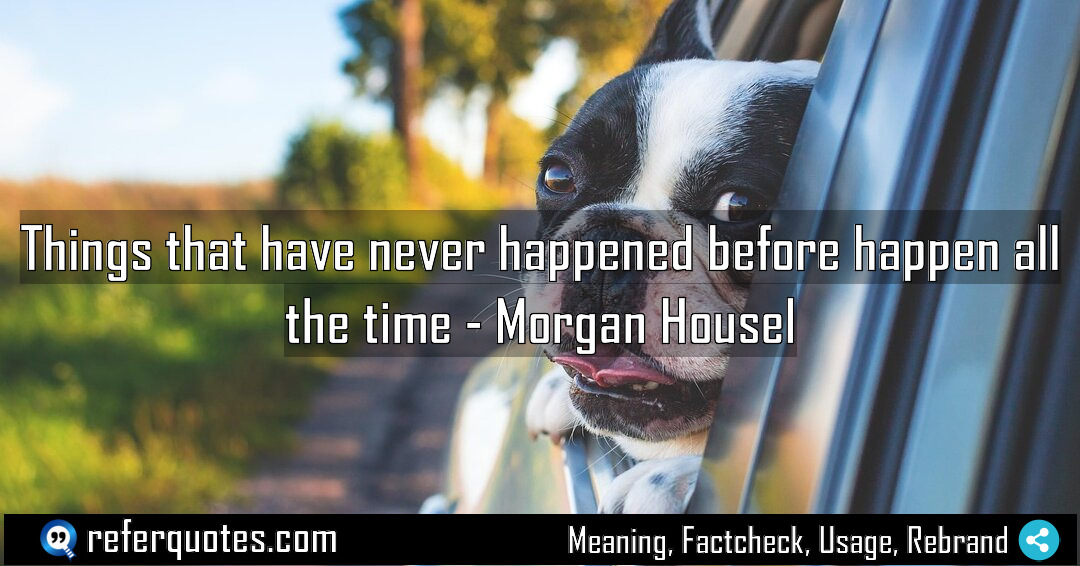
You know, the most profound financial truths are often the simplest. Things that have never happened before happen all the time, and understanding that is the key to building real, lasting wealth. It’s a simple idea that completely reframes how we see risk and the future.
Share Image Quote:
Table of Contents
Meaning
At its core, this quote is a powerful reminder that history is not a perfect guide to the future. Just because something is unprecedented doesn’t mean it’s impossible.
Explanation
Look, we all fall into this trap. We look at the data, the charts, the past 50 years of market performance, and we think we have a playbook. But the world is a complex, adaptive system. A new technology emerges, a geopolitical event unfolds, a social trend goes viral—and the entire game changes overnight. The “100-year flood” can happen twice in a decade. The “impossible” market crash becomes reality. It’s not about being paranoid; it’s about being humble. It’s about building a financial plan and a mindset that isn’t shattered by the unexpected, but one that expects the unexpected. That’s the real edge.
Quote Summary
Reading Level50
Aesthetic Score60
Origin & Factcheck
This gem comes straight from Morgan Housel’s fantastic 2020 book, The Psychology of Money. It’s a modern classic for a reason. You might see similar sentiments floating around, but this specific phrasing is Housel’s. He has a real talent for distilling complex ideas into these unforgettable, punchy truths.
Attribution Summary
Where is this quotation located?
| Quotation | Things that have never happened before happen all the time |
| Book Details | Publication Year: 2020; ISBN-10: 0857197681; ISBN-13: 978-0857197689; Pages: 256 (approx.) |
| Where is it? | Unknown chapter / page |
Context
In the book, Housel uses this idea to explain why the most dangerous financial risks are the ones we’ve never seen before—the ones that don’t show up in our historical models. He’s arguing against over-reliance on past data and for the importance of building a margin of safety into everything you do.
Usage Examples
So how do you actually use this? Let me give you a couple of scenarios.
First, for an investor: Instead of betting the farm on a strategy that’s “always worked,” you diversify. You acknowledge that a black swan event could wipe out any single asset class, so you spread your risk. You hold cash not because it has great returns, but because it gives you options when the unprecedented happens.
Second, for a business leader: You don’t just plan for linear growth. You stress-test your business model against wild scenarios. What if a new law passes? What if a competitor does something completely irrational? What if a global pandemic forces everyone home? Oh wait, we lived that one. See? It happens.
And for anyone building a career: Don’t assume your industry will look the same in ten years. Be learning, be adaptable. The skill that’s irrelevant today might be the most valuable thing tomorrow.
To whom it appeals?
Share This Quote Image & Motivate
Motivation Score50
Popularity Score65
Shareability Score60
FAQ
Question: Does this mean we should ignore history and data completely?
Answer: Absolutely not. History is our best teacher for understanding human behavior and probabilities. But it’s a flawed teacher. Use it as a guide, not a gospel. The key is to respect the vast universe of things that *could* happen that haven’t happened *yet*.
Question: How can you plan for something that’s never happened?
Answer: You can’t plan for the specific event. But you can build a system that is robust and resilient to shocks. That means having emergency funds, low debt, diverse income streams, and a flexible mindset. You’re not predicting the storm; you’re building a boat that can handle rough seas.
Question: Isn’t this just a fancier way of saying “expect the unexpected”?
Answer: It’s the *why* behind “expect the unexpected.” It’s not just a cliché; it’s a conclusion based on the nature of complex systems. It gives the cliché its intellectual weight and practical application, especially in finance and strategy.
Similar Quotes
You know, I was re-reading some Tolle the other day, and this one line just hit me all over again: “Nothing ever happened in the past; it happened in the…
Nothing in this world happens by chance is a powerful lens for viewing life’s events. It suggests a hidden order, a meaningful tapestry woven from every single thread, even the…
Everything happens for a reason and a purpose… it’s a powerful idea, but it’s not about blind optimism. It’s a call to action, a tool for finding meaning and taking…
What counts in life is not what happens to you… it’s the story you tell yourself about it. That narrative, that memory, is your real reality. It’s the filter through…
What matters in life is not what happens to you… it’s the story you build from your memories. This isn’t just positive thinking; it’s a fundamental tool for reshaping your…
